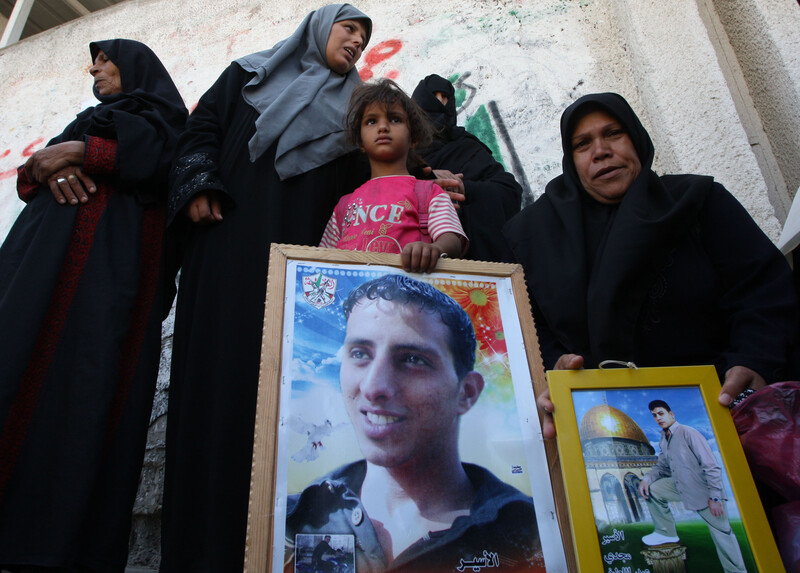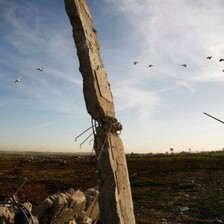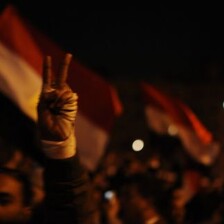The Electronic Intifada Gaza Strip 22 July 2011

The fate of family members in Israeli prisons is of greater importance to women in Gaza than the “right” to ride a motorcycle.
Maan ImagesRecently, I was at a meeting with a foreign diplomat who wanted to hear about the problems that young people in Gaza face, and hear our suggestions for how the international community can lend a helping hand.
We were a group of seven young people of different professions and backgrounds. The hour and a half discussion touched on topics such as problems resulting from the Hamas-Fatah division and the lack of sport facilities in Gaza. Toward the end of the discussion a particularly quiet young woman in the group decided to speak out.
“As a young woman in Gaza, I face a real problem.” Eagerly waiting for her contribution, I was expecting her to say that despite their higher university enrollment and success rates, young women in Gaza find very few job opportunities, for instance. “I am not convinced by the hijab [headscarf], but I cannot take it off.”
While this comment left the rest of the now embarrassed group trying to figure out a quick way to solve the mess, the look on the diplomat’s face signaled that she had just had an epiphany. The diplomat suggested that the international community she represents come to Gaza and teach its Hamas-suppressed people, particularly women, about their rights.
The story of our life: the White Man (and Woman) come to Palestine to teach us about our rights, while supporting the very entity that is continuously depriving us of them. In Gaza, add to that blaming the deprivation on the local government, and taking the burden off the real cause of this deprivation: Israel’s siege and occupation.
After the discussion was over, I spoke to the girl who made the comment, reminding her that the Hamas government does not ban girls from not wearing the hijab. If she comes from a conservative family or lives in a conservative area of the Gaza Strip, it’s not the government’s fault, and the foreign diplomat did not need to hear about it.
There’s a fine line between our mildly conservative traditions and the rules that Hamas imposes on our society, and the two need not be mixed for the sake of our image.
Yet, no matter how hard we try or how vocal we are, international media will always focus on personal issues that are not representative of the public to describe a “problem” faced by the general population. Why? It is because the issue of women’s rights in particular is such a sensitive one and using it is guaranteed to evoke anger or sympathy in the heart of the listener, regardless of the logic behind the argument.
For instance, a few months ago, a “unique” story was covered by several major news agencies that described the harshness of the Hamas regime in Gaza by stating that women in Gaza are not allowed to ride motorcycles.
This spurred a lot of talk and media attention among the good-hearted international media community, so very concerned about the situation of women under the Hamas government in Gaza.
But did any of these media agencies care to ask even as few as ten women in Gaza what they thought of the “right” to drive motorcycles? No, because they know that these women, who really have no time to spare on such needless matters, would have ridiculed them. The women would be more wiling to discuss real issues that matter to them, such as women in Israeli jails, poverty, lack of adequate health care, lack of education and job opportunities that are mainly attributable to the Israeli occupation.
Instead, international media decide to focus on mundane, yet “attractive” issues that affect very few women in Gaza, but that do a good job in ruining the image of Gaza and of Hamas. Real issues do not matter. Put aside issues that are caused by the occupation — we already know those, we are told. Tell us about problems caused by the Hamas government.
A year after the Hamas government imposed a law banning women from smoking water pipes in public places in Gaza, international media agencies still raise the issue when they cover the situation of women, even though the law was cancelled. And recently, news about banning male hairdressers from styling the hair of women has made headlines all over the world even though the issue is limited to hairdressers themselves and their customers, not the whole female population of the Gaza Strip.
I am against political affiliations, which is why my first and only affiliation is with Palestine and the Palestinian cause, not Fatah, Hamas or any other faction.
But I cannot stand the hypocrisy of international media in exploiting a subject as sensitive as women’s rights to lift the burden off of Israel’s shoulders.
When will the world understand that the deterioration of the situation of women in Gaza over the past four years is not solely attributed to Hamas’ control, but mainly because of the Israeli siege, which tends to be left out in such discussions? I take pride in saying that Gaza in particular and Palestine in general is one of the few places in the world where women and men enjoy equality in rights — or rather equality in the lack thereof.
Indeed, Israel implements excellent standards of affirmative action in making sure that both men and women are equally deprived of their most basic human rights, so please stop attributing the results of this deprivation to others whose role in the grand scheme of our lives is marginal.
Yasmeen El Khoudary is a freelance writer and researcher based in Gaza City, Palestine. Her blog is yelkhoudary.blogspot.com and she can be followed on Facebook and Twitter.





Comments
i know a Palestinian
Permalink Rana replied on
i know a Palestinian Christian in Gaza who wants to travel to the West Bank to get married but she does not have the liberty to travel to another Palestinian city outside of Gaza. Israel is depriving her of freedom of movement and married life to someone she cares for.
Does the International media care about the countless loves lost and hearts made sick by deferring hope of marriage and new life?
Oppression
Permalink Radical Uterus replied on
I apologize for the western media that ignores bombs in favor motorcycles. The women who you refer to would rather have freedom of movement then worry about how to get there. I get it.
Women in Gaza
Permalink Philomena replied on
yasmeen El Khoudary makes an excellent point regarding the western press and do gooders about the apparent over emphasis on issues that effect a minority of women in Gaza, ie the women who would prefer to have their hair coiffed by a male hairdresser, the women who wish to ride motorbikes, the women who wish to partake of the hubbly bubbly and for all I know there are other issues oh yes the young woman who does not wish to wear a scarf but feels obliged to do so. But I can assure Ms. El Khoudary that her reckless disregard for the above minority has not in any way advanced the cause of the majority. Neither has the stalemate policy of Hamas with regard to the siege of Gaza. Like it or not you will be known by the way you treat your least powerful and you are not different from the rest of the world; women are not in positions of power so it is vital that we hang on to every scrap of liberty we have even the mundane choice of hairdresser. Your young colleague needed understanding and support not an offensive.
Insulting phrse "the White Man"
Permalink Gregory Wonderwheel replied on
I strongly object to the phrase "the White Man (and Woman) come to Palestine." This is nothing short of racism. Please don't talk that way. There is no such thing as "The White Man." It is a false concept that the oppressor wants to use to oppress people who don't belong to the group they call "The White Man." For example, here in the USA, Palestinians are "The White Man" in the context of the person using the label to enlist Palestinian-Americans to the side of the group oppressing African-Americans or Hispanic-Americans. To divide people into White, Black, Brown, Yellow or Red is just a racist way of viewing the world. The chromatic truth is that all people are just many many different shades and tints of brown. To call light brown "white" and dark brown "black" is just a way to put people into boxes, and the only purpose of putting people into such boxes is to create "us and them" frames of mind. If Palestinians feel oppressed, as they should, then if they want to be truly free they should not adopt the language frames of the oppressor and use such erroneous terminology such as "The White Man."
On Real and Imaginary Oppressors of Women
Permalink Amal A replied on
I agree with the previous poster. See my response at:
http://arabwomanprogressivevoi...
White man comment
Permalink Sam Abel replied on
I can understand the hesitation (fear?) in recognizing (rightfully so) that the white man/woman migrated to Palestine, to create Israel. In describing Israel-Palestine along these terms, Apartheid becomes a clear concept for defining the Zionist project in Palestine. History supports such an analogy. First, Israel was founded as a Jewish-European settler state. In fact, most Palestinians in Gaza are refugees from what is now known as Israel, having been displaced during the (extremely brutal) creation of Israel by mostly white Zionist settlers and militias. Some may resent the categorization, especially considering that a number of Israelis trace their origins to Jews from Arab countries. Yet, one needs only to look at the hundreds of thousands of white settlers from the US, France, and other European countries, not to mention the over one million Israelis from Russia and Eastern Europe (also 'white'). Perhaps George Wonderwheel might instead present a term he would agree with, to replace the 'white' reference. Zionist does not convey the same message, considering it is both ideology and political platform (not to mention justification for ethnic cleansing). Perhaps European-Anglo colonial Jewry?
Palestinians in the US
Permalink Sam Abel replied on
Palestinians are definitely 'black' in the US, when taking into consideration the demonized stereotypes and racial profiling. Black Palestine.
thats not the issue
Permalink leila replied on
salam aleickum ,as a woman born out of a falasteenian father ALLAH YER7MOO ,,,,,LOCATED IN THE STRIP ,,,its not a matter of wearing hidjaab or not ?and blame hamas for that there are no jobs ,also my brothers don t have any work ,and yes islam sunnah recoments that a woman covers herself ,,,,so look at major problems first wich are not comming from hamas !
reasoned
Permalink Walter Kovacs replied on
Well done.
A good way to show how we are distracted in the media and not allowed to deal wit h issues porperly.
Focusing on touch paper topics distract us from looking at the real issues. Our first concern with any military occupation should be the civilians safety and removal of soldiers.
Then and only then can you work on improving the lives of those effected.
THANK U YASMEEN
Permalink AYMAN NIJIIM replied on
YOU DID A GOOD FEATURE ARTICLE ON THE SITUATION OF THE WOMEN IN GAZA